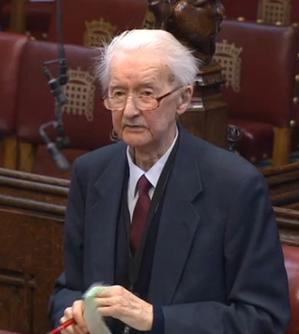Randolph Quirk facts for kids
Quick facts for kids
The Lord Quirk
|
|
|---|---|

Lord Quirk in 2016
|
|
| Member of the House of Lords Lord Temporal |
|
| In office 12 July 1994 – 20 December 2017 |
|
| Vice-Chancellor of University of London | |
| In office 1981–1985 |
|
| Preceded by | Lord Annan |
| Succeeded by | Lord Flowers |
| Personal details | |
| Born |
Charles Randolph Quirk
12 July 1920 Isle of Man |
| Died | 20 December 2017 (aged 97) |
| Nationality | British |
| Education | St Ninian's High School, Douglas |
| Alma mater | Yale University University College London Michigan State University |
| Occupation | Linguist |
| Military service | |
| Allegiance | |
| Branch/service | |
| Years of service | 1940–1945 |
| Rank | Squadron leader |
| Unit | Bomber Command |
Charles Randolph Quirk, Baron Quirk (born July 12, 1920 – died December 20, 2017) was a famous British linguist. A linguist is someone who studies language and how it works. He was a top professor of English language at University College London (UCL) for many years, from 1968 to 1981. He was also a member of the House of Lords, which is part of the British Parliament.
Contents
Early Life and Education
Charles Randolph Quirk was born on July 12, 1920, on a farm called Lambfell, near Kirk Michael on the Isle of Man. His parents were Thomas and Amy Randolph Quirk.
He went to Douglas High School for Boys on the island. After high school, he started studying English at University College London (UCL) in 1939. However, his studies were paused in 1940 because of World War II.
Military Service During World War II
During the war, Charles Quirk served for five years in the RAF. He was part of Bomber Command and rose to the rank of squadron leader. He became very interested in explosives during this time.
After the war, from 1945 to 1947, he finished his English degree at UCL.
Academic Career and Research
After finishing his studies, Charles Quirk became a junior lecturer at UCL. He earned his Master's degree (MA) in phonology (the study of sounds in language) and his PhD in syntax (the study of how words form sentences).
In 1951, he received a special fellowship to study in the United States at Yale University and Michigan State University. When he returned in 1952, he moved to the University of Durham. He became a professor there in 1958.
In 1960, he came back to UCL as a professor. In 1968, he became the Quain Professor of English, a very important position, which he held until 1981. He taught about Old English (Anglo-Saxon) and the history of the English language.
In 1985, the University of Bath gave him an honorary degree called Doctor of Letters.
The Survey of English Usage
In 1959, Professor Quirk started an important project called the Survey of English Usage. He worked with other experts like Valerie Adams, Derek Davy, and David Crystal. Their goal was to study how British English was actually used between 1955 and 1985.
They collected 200 different texts, each with 5,000 words. These texts included both written materials and recordings of spoken English, like conversations and speeches.
This project led to a very important book called A Comprehensive Grammar of the English Language. This book was different because it described how people really used English, instead of just giving strict rules. Professor Quirk and his team believed that what is "correct" in language is what helps people communicate clearly. This was a new and exciting way to look at grammar.
Awards and Recognition
Charles Quirk received many honors for his work.
- In 1976, he was made a Commander of the Order of the British Empire (CBE).
- In 1985, he was knighted, which means he was given the title "Sir."
- From 1985 to 1989, he was the President of the British Academy, a leading group for humanities and social sciences.
- On July 12, 1994, he became a life peer and was given the title Baron Quirk, of Bloomsbury. This meant he could sit in the House of Lords as a cross-bench peer, meaning he didn't belong to a specific political party.
Personal Life
Charles Quirk lived in both Germany and England until he passed away in 2017. His second wife was Gabriele Stein, who was also a linguist from Germany. She died in 2020.
See also
 In Spanish: Charles Randolph Quirk para niños
In Spanish: Charles Randolph Quirk para niños
 | Stephanie Wilson |
 | Charles Bolden |
 | Ronald McNair |
 | Frederick D. Gregory |

